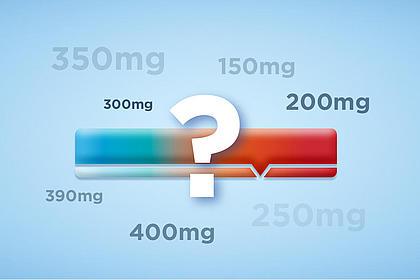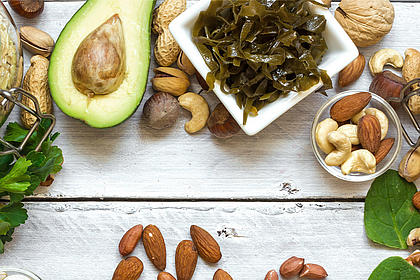Krämpfe beim Sport durch Mangel an Magnesium?

Für Sportler spielt eine gute Magnesiumversorgung eine wichtige Rolle. Denn beim Schwitzen verlieren wir wertvolle Mineralstoffe – darunter auch Magnesium. Da der Mineralstoff aber gleichzeitig für den Energiestoffwechsel und damit auch für die richtige Power unverzichtbar ist, sollten Sie beim Sport Ihren Magnesiumspeicher immer im Blick behalten.
Magnesium und Sport: das Wichtigste auf einen Blick
- Magnesium spielt für den Energiestoffwechsel und die Leistungsfähigkeit beim Sport eine zentrale Rolle.
- Schwitzen begünstigt Magnesium-Verluste.
Für Sportler kann sich der Tagesbedarf erhöhen. Sie sollten besonders auf eine ausreichende Zufuhr von Magnesium achten.
Volle Power dank Magnesium: Treibstoff für die Muskeln
Egal, ob wir joggen, schwimmen, Fußball spielen oder wandern: Um den Körper zu bewegen, brauchen unsere Muskeln Energie. Ihr Energielieferant heißt ATP (Adenosintriphosphat) – ohne ihn könnten Muskeln gar nicht funktionieren. Es wird in den Muskelzellen gespeichert. Dieser Vorrat wird aber bei schwerer körperlicher Arbeit oder Sport schneller aufgebraucht.
Beim Spalten des Moleküls durch Enzyme in Adenosindiphosphat (ADP) und Phosphat wird Energie frei, welche von den Muskeln zum Zusammenziehen benötigt wird. Diese äußerst energiereiche Verbindung kann von der Muskulatur allerdings nur dann optimal genutzt werden, wenn ausreichend Magnesium vorhanden ist. Im Umkehrschluss bedeutet das: Wird Magnesium knapp, können die Muskelzellen ihren Energiebedarf nicht mehr vollständig decken.
Darum ist eine ausreichende Versorgung mit Magnesium beim Sport wichtig
Wer viel trainiert, schwitzt auch viel. Das Problem: Je intensiver und umfangreicher Sport betrieben wird, desto mehr Magnesium wird aus den körpereigenen Magnesiumspeichern mobilisiert. Schließlich perlt mit dem Schweiß auch Magnesium aus den Poren. Insofern sind aufgrund des vielen Schwitzens vor allem Ausdauer- und Wettkampf-Sportler häufig nicht ausreichend mit Mineralstoffen versorgt.
Aber auch Kraftsportler nehmen manchmal zu wenig Magnesium ein, wenn sie beispielsweise eine hohe Eiweißaufnahme anstreben. Bei besonderen Ernährungsformen besteht die Gefahr, dass wichtige Mikronährstoffe zu kurz kommen.1
Fehl- und Überbelastung einzelner Muskelgruppen beim Sport können sich in schmerzhaften Krämpfen äußern. Magnesium als wichtiges Element für eine normale Muskelfunktion sollte dem Körper daher in ausreichender Menge zur Verfügung gestellt werden.
Magnesium gezielt zuführen: Tipps für Sportler
Damit Sportler ihre volle Leistung bringen können, müssen die Magnesiumspeicher voll und alle Muskelzellen ausreichend versorgt sein. Denn Magnesium ist wichtig für den Energie- und Eiweißstoffwechsel sowie für eine vitale Muskelfunktion.
Das Problem: Allein durch eine magnesiumreiche Ernährung lässt sich der erhöhte Bedarf an Magnesium nicht immer decken. Neben der Optimierung der Ernährungsgewohnheiten kann dann unter Umständen auch eine zusätzliche Zufuhr durch geeignete Magnesium-Präparate aus der Apotheke hilfreich sein.
Eine ausreichende Versorgung mit Magnesium ist eine gute Voraussetzung, um einer Mangelsituation beim Sport vorzubeugen. Leistungssteigerungen durch eine gezielte Einnahme des Minerals konnten bisher hingegen nicht festgestellt werden.



